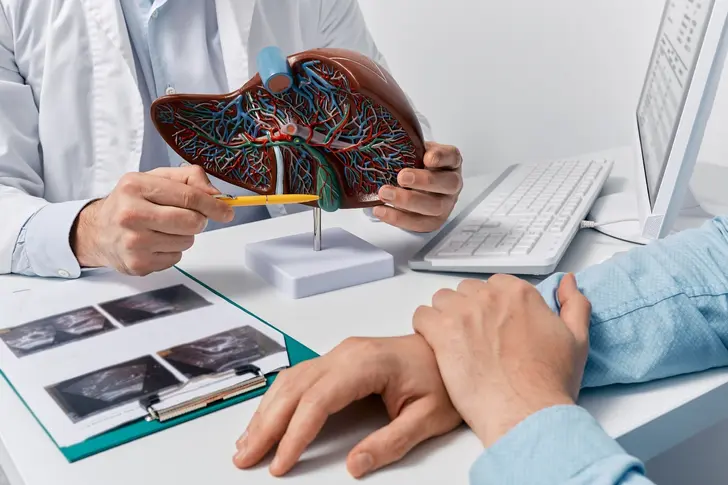Hepatitis C Treatment: What to Expect


Understanding Hepatitis C Treatment
Hepatitis C is a serious liver infection brought on by a virus you can catch from contaminated blood. The good news is that it is curable, and today's treatments are more effective and have fewer side effects than in the past. Many people can now get rid of the virus by taking a pill for just a few weeks. Here's a closer look at how hepatitis C is treated and steps you can take to help the medicines work well.

Direct-Acting Antivirals: A Game Changer
Direct-acting antivirals (DAAs) have revolutionized hepatitis C treatment. These oral medications target the virus directly, stopping it from multiplying. Most people take DAAs for 8-12 weeks, with success rates of over 90%. Side effects are usually mild, like headache or fatigue. Your doctor will choose the best DAA combination based on your specific hepatitis C genotype and overall health. You'll need to complete the full course of treatment to have the best chance of curing the infection.

Lifestyle Changes: Supporting Your Treatment
While you take your hepatitis C medicine, it's important that you don't put more strain on your liver. Avoid alcohol, as it can worsen liver damage. If you smoke, quitting may help you respond better to your treatment. Your liver will no longer have to work to clear the cancer-causing substances in tobacco. Hepatitis C puts you at risk for diabetes, so eat a diet that will help you stay, or reach, a healthy weight.

Nutrition: Fueling Your Body for Recovery
There is no special hepatitis C diet that cures the disease. But what you eat makes a difference in how healthy you are with the disease. Focus on whole grains, lean proteins, fruits, and vegetables. Limit processed foods, saturated fats, and added sugars, which can stress your liver. Stay hydrated by drinking plenty of water. Some people with hepatitis C find that the disease makes them less hungry. If this happens to you, trying to eat smaller meals more often throughout the day. Check with your doctor before taking any supplements. Some – such as high doses of vitamin D or iron – can hurt your liver.

Exercise: Boosting Your Body's Defenses
Regular physical activity can be a powerful ally in your fight against hepatitis C. Exercise helps maintain a healthy weight, reduces insulin resistance, and may even slow the progression of liver disease. Aim for at least 150 minutes of moderate activity per week like brisk walking, swimming, or cycling. Start slowly and gradually increase intensity. Talk to your doctor before starting a new exercise routine, especially if you have advanced liver disease or other health conditions.

Managing Side Effects
While modern hepatitis C treatments have fewer side effects, you might still experience some discomfort. Common side effects include fatigue, headache, and nausea. To manage these, get plenty of rest, stay hydrated, and eat small, frequent meals. If side effects persist or worsen, talk to your health care provider. They can offer additional strategies or adjust your treatment if necessary.

Tracking Your Progress
Throughout your treatment, your doctor will monitor your progress with blood tests. These tests check your viral load (the amount of virus in your blood) and liver function. It's important to go to all your scheduled appointments and complete all recommended tests. That way, your health care team can make sure your treatment is working the way it should. You might find it helpful to write down any questions you have for the doctor before these checkups.

Your Emotional Well-Being
Living with hepatitis C can be emotionally challenging. Seek support from friends, family, or a mental health professional. Many hospitals offer support groups for people with hepatitis C, providing a space to share experiences and coping strategies. Practicing stress-reduction techniques like meditation or yoga can also help.

Life After Treatment
Your treatment is a success if tests show that the hepatitis C virus is no longer in your blood three months after you stop taking the antiviral medicine. When you reach this milestone, it's a good sign you'll stay virus-free. To keep your liver healthy, continue the good habits you've developed during treatment. Regular checkups with your doctor are important to monitor your liver function. If you have cirrhosis, you may need ongoing screening for liver cancer.

Preventing Reinfection
After successful treatment, you'll want to protect yourself from reinfection. Hepatitis C is primarily spread through blood-to-blood contact. Avoid sharing personal items like razors or toothbrushes. If you use injectable drugs, never share needles or other equipment. Practice safe sex, especially if you have multiple partners. By taking these precautions, you can significantly reduce your risk of reinfection and maintain your health after treatment.
Image Credits:
1) Peakstock/Shutterstock
2) Peopleimages.com/Shutterstock
3) KomootP/Shutterstock
4) New Africa/Shutterstock
5) Zamrznuti tonovi/Shutterstock
6) MDV Edwards/Shutterstock
7) Kamil Macniak/Shutterstock
8) fizkes/Shutterstock
9) fast-stock/Shutterstock
10) fongbeerredhot/Shutterstock
SOURCES:
HCV Advocate: “A Brief History of Hepatitis C.”
CDC: "Hepatitis C FAQs for Consumers."
Curry, M.P. New England Journal of Medicine, Dec. 31, 2015.
FDA: "FDA Drug Safety Communication: FDA warns of serious liver injury risk with hepatitis C treatments Viekira Pak and Technivie," "FDA approves Viekira Pak to treat hepatitis C," "Drug Trials Snapshots: VOSEVI," "FDA approves Epclusa for treatment of chronic Hepatitis C virus infection."
Feld, J. NEJM, Nov. 23, 2015.
HCV Advocate. "What is Cirrhosis?"
HCV New Drug Research: “ZEPATIER - Recommended Dosage and Durations, Drug Interactions, Side Effects, Clinical Studies.”
News Release, Gilead.
News Release, Merck.
Up-To-Date: “Direct-acting antivirals for the treatment of hepatitis C virus infection.”
U.S. Department of Veterans Affairs: "Hepatitis C Virus Genotypes and Quasispecies."
University of Washington: "Sofosbuvir (Sovaldi)."
Zeuzem, S. Annals of Internal Medicine, July 7, 2015
Thelma King Thiel, chair and CEO, Hepatitis Foundation International.
David Thomas, MD, professor of medicine, Johns Hopkins School of Medicine, Baltimore.
Howard J. Worman, MD, associate professor of medicine and anatomy and cell biology, College of Physicians and Surgeons, Columbia University, New York City.
The American Gastroenterological Association.
CDC.
The Hepatitis Foundation International.
The HCV Advocate.
American Liver Foundation "Liver Disease Diets" Feb. 14, 2024
Medscape: "FDA Panel Backs Sofosbuvir for Hepatitis C," "FDA Panel Recommends Approval of Simeprevir for Hepatitis C."
U.S. Department of Veterans Affairs: "Hepatitis C Treatment Side Effects Management Chart."
UpToDate: "Patient Information: "Hepatitis C (Beyond the Basics)."
FDA: "FDA approves Mavyret for Hepatitis C," "Mavyret Prescribing Information."
Hepatitis C Online: "Elbasvir-Grazoprevir (Zepatier)," "Sofosbuvir-Velpatasvir-Voxilaprevir (Vosevi)."
Medline Plus: “Daclatasvir,” “Ombitasvir, Paritaprevir, and Ritonavir,” “Peginterferon Alfa-2a Injection,” “Ribavirin,” “Sofosbuvir
HHS AIDSinfo: “Peginterferon Alfa-2a (HBV, HCV).”
U.S. Department of Veteran's Affairs, "Hepatitis C and Tobacco Use."